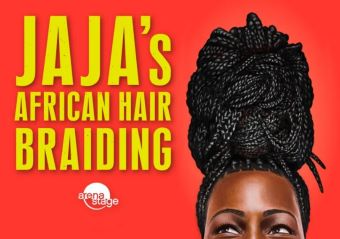WEAVING TOGETHER THE IMMIGRANT EXPERIENCE
JaJa’s African Hair Braiding – beginning a regional tour after Broadway success and Arena Stage’s season starter – is a peek into the immigrant experience in America, served up with laughter and fears of deportation. Written by Ghanaian American Jocelyn Bioh and directed by Whitney White, the play is both political and provincial.
It tells the story of a day in the life of a hair braiding salon in Harlem on a hot summer day in 2019. The owner, JaJa, and many of her employees and customers, are West African and struggling to stay afloat, while maintaining a sense of community and support.
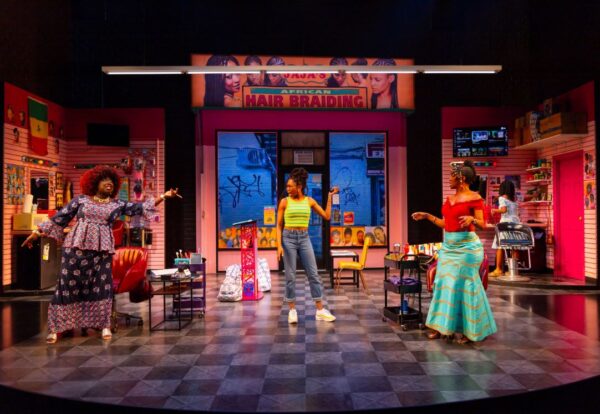 Awa Sal Secka, Jordan Rice, Tiffany Renee Johnson, and Bisserat Tseggai
Awa Sal Secka, Jordan Rice, Tiffany Renee Johnson, and Bisserat TseggaiThe setting is a fearful time for immigrants. A year before the play takes place, then president Trump expressed his belief that not all immigrants should be welcomed in the U.S. The characters of this play actively feel this xenophobia, while maintaining their African identities through accents (kudos to dialect coach Yetunde Felix-Ukwu), clothing (costumes by Dede Ayite), and of course, hair styles (designed by Mikiya Mathis).
“All black hairstyles are political,” states the theater’s program. In the theater’s lobby, a poster encourages patrons to join the CROWN (Creating a Respectful and Open World for Natural hair) Movement.
At the same time, this play provides immense comic relief. Braiders from Senegal, Nigeria, and Sierra Leone bicker, scold, and gossip the day away, but rally around each other when solidarity is needed. Bioh pokes playful fun at the close-knit community.
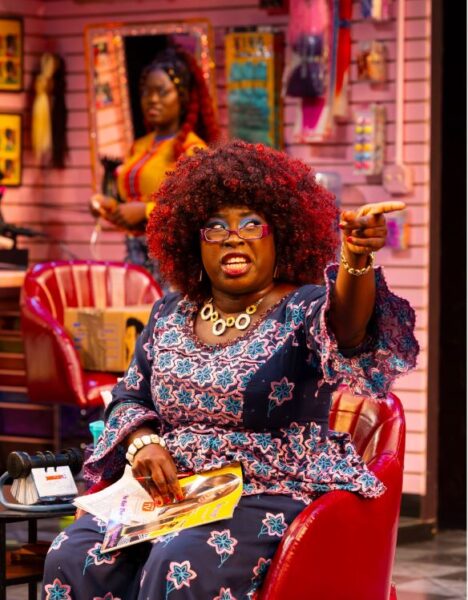 Aisha Sougou and Awa Sal Secka
Aisha Sougou and Awa Sal SeckaThe funniest, yet most annoying character, is Bea, expertly played by Awa Sal Secka. A loud-talking complainer, she doesn’t hold back her harsh opinions of everyone, at times scaring off the paying customers. She especially has it out for co-worker Ndidi, played by Aisha Sougou, who arrived at the shop after hers burned down. She hilariously and rightfully accuses Ndidi of stealing her customers, who are reluctant to sit in the offensive Bea’s chair. After an explosive episode of her tirades, comes her sidesplitting line: “Look at the kind of shop your mother is running!”
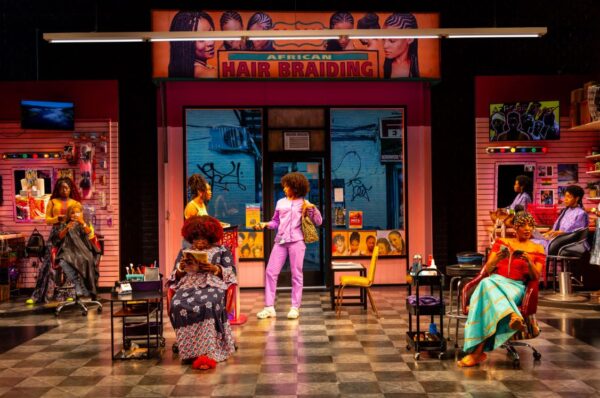 Aisha Sougou, Melanie Brezill, Awa Sal Secka, Jordan Rice,
Colby N. Muhammad, Tiffany Renee Johnson, Bisserat Tseggai, Mia Ellis
Aisha Sougou, Melanie Brezill, Awa Sal Secka, Jordan Rice,
Colby N. Muhammad, Tiffany Renee Johnson, Bisserat Tseggai, Mia EllisJaJa’s customers are just as uproarious. A Beyoncé wannabe demands floor-length blond braids like the singer donned in her “Formation” video. “I will make you Beyoncé today!” promises her braider. The client, played by Melanie Brezill, proudly gets up from her chair when her hair is done, and vigorously whips her braids around, resulting in squeals of laughter from the audience.
Awa Sal Secka, Aisha Sougou, and Melanie Brezill
Colby Muhammad plays a young, over-the-top finicky New Yorker, who insists on directing her braider with explicit instructions, and then promptly falls asleep in her chair the moment the braiding begins.
Attitude is one characteristic of which these women are not in short supply. Though many of the women are caricatures, Bioh endows them with endearment.
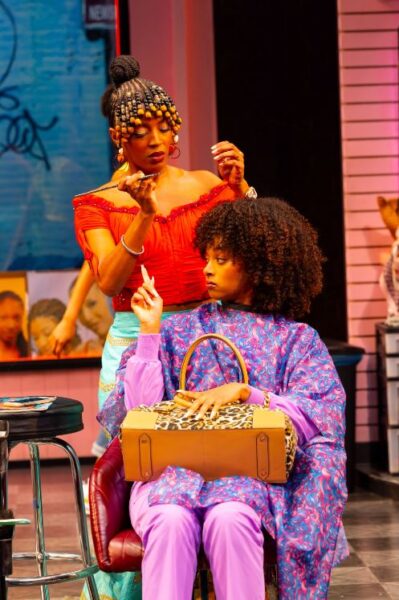 Tiffany Renee Johnson and Colby N. Muhammad
Tiffany Renee Johnson and Colby N. MuhammadAlthough this is a woman’s world, it wouldn’t be the same without a few men rotating in and out of the drama. Yao Dogbe plays multiple roles, including a sock and jewelry peddler, who the women all know by name, and Aminata’s husband who gives her a run for her money.
Salon owner JaJa, played by Victoire Charles, doesn’t make her grand entrance until the end of the play. She dons an extravagant white wedding dress, as it is her wedding day. She, an undocumented immigrant, is marrying a white man of whom her cohorts are suspicious — as is her daughter, Marie (Jordan Rice), who helps her mother run the salon. Marie’s uncertain academic future rides on the success of this marriage. Currently, she is using the identity of a cousin she’s never met, as she is illegal even though she arrived in America at the age of four.
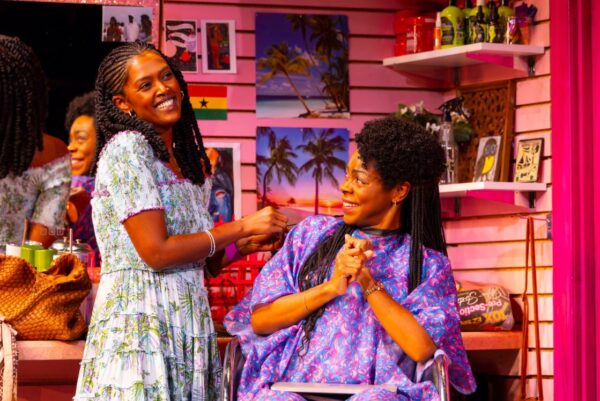 Bisserat Tseggai and Mia Ellis
Bisserat Tseggai and Mia EllisThe set, designed by Teresa L. Williams, is a perfect backdrop for the bustling microcosm world of these characters. Purple neon lights up photos of beautiful Black women wearing an array of hairstyles. Braider’s chairs and mirrors revolve on and offstage, creating two sets – inside the salon and outside on the street. Although the play takes place in one full day, the action is divided up into short vignettes.
When all is said and done, JaJa’s Arican Hair Braiding uses comedy to approach sensitive political matters. It serves as entertainment and an educational lesson about the immigrant experience in America. For those who enjoy being amused while learning, this play comes highly recommended.
Awa Sal Secka (Bea), Colby N. Muhammad (Vanessa/Sheila/Radia), Melanie Brezill (Michelle/Chrissy/LaNiece), Victoire Charles (Jaja), Bisserat Tseggai (Miriam), Jordan Rice (Marie), Tiffany Renee Johnson (Aminata)
photos by T. Charles Erickson Photography
JaJa’s African Hair Braiding
Arena Stage at the Mead Center for American Theater
Kreeger Theater, 1101 Sixth Street, SW, D.C.
Tuesday, Wednesday, and Sunday at 7:30
Thursday, Friday, and Saturday at 8
Saturday and Sunday at 2
weekday matinees at 12pm on September 26, October 2 and 9
ends on October 13, 2024
for tickets, call 202.488.3300 or visit Arena Stage
tour continues:
Berkeley Repertory Theatre November 8, 2024
Chicago Shakespeare Theater January 14, 2025
